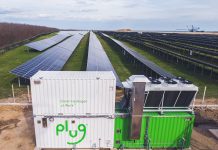Here, Dr Tom Mason, CEO of Bramble Energy, shares his views on how a Trump and Starmer government might impact the US and UK’s energy sovereignty and ambitious net-zero targets
Over the past few years, the conversation around the importance of energy sovereignty has shifted significantly, especially since the Russia-Ukraine conflict began.
Referring specifically to a nation’s ability to control and manage its energy resources and policies independently, countries worldwide increasingly recognise the need to make their economies less reliant on volatile international politics and external factors for energy security.
The push for energy sovereignty has also become important in the international transition to net zero emissions.
However, more global approaches and desired outcomes to energy sovereignty are needed. Some nations, like China, have long pursued policies to achieve energy independence, reflecting varying strategies and priorities in pursuing energy sovereignty. In contrast, others, like Russia, have leveraged their vast oil and natural gas reserves to exert influence in global energy markets and assert their geopolitical interests.
Trump’s drill, drill, drill agenda
Over in the US, where we’re currently in the run-up to the next presidential election, there’s a real focus on nationalist agendas to bolster their energy independence and sovereignty.
Were Trump, known for advocating a ‘Drill, Drill, Drill’ narrative, to come into power this year, it’s expected that his administration would likely prioritise policies to advance energy sovereignty via domestic fossil fuel production.
The move to expand oil, natural gas, and coal extraction within the US would likely come with a significant push to reduce regulations on the fossil fuel industry, streamline permitting processes for energy projects, and open up more federal lands and waters for exploration and drilling. We may even see initiatives to incentivise investment in fossil fuel infrastructure, such as pipelines and refineries.
Granted, ramping up domestic fossil fuel production could reduce the US’s reliance on imported energy resources, thereby enhancing energy sovereignty (and, with it, contributing to job creation, economic growth, and energy security). However, the impacts of fossil fuel extraction on climate change, local communities, and natural habitats are concerning.
If Trump implements a fossil fuel-focused energy strategy, it may enhance long-term energy instability and go directly against global efforts to transition to cleaner energy sources.
Starmer’s U-turn on green investment plans
Where I’m based, here in the UK – a country needing more natural resources to achieve energy sovereignty – things are different. In recent years, we’ve emphasised energy sovereignty as part of our energy policy, as highlighted by Labour’s £28bn green investment pledge in 2021. At the time, this was promised to be spent on battery manufacturing, hydrogen power, offshore wind, tree planting, flood defences and home insulation.
However, when Labour’s Starmer announced this green prosperity plan was being slashed in half to under £15bn last week, environmental groups, unions and others in the energy sector were discouraged.
With the UK’s next general election looming, it’s a move that, should Labour come into power, is simply kicking the can down the road. It’s also especially concerning in the face of the UK’s cost of living crisis, an economic situation fundamentally created by instability in global energy markets. The UK has world-leading talent and innovations fighting the impacts of climate change, but efforts can’t continue with sustained government support and, more crucially, vital investment, efforts can continue.
To reach our ambitious net-zero emissions targets set by policymakers, net-zero emissions by 2050, we need to stick to long-term action. In light of decades of environmental degradation, action that will far outlast a four-year political cycle is a blink of an eye.
One of two things needs to happen to achieve energy sovereignty in the UK: renewables and transition fuels become cheaper and more convenient than a fossil fuel equivalent, or governments intervene to make fossil fuel use more expensive than the open market.
While the first will likely happen over time with technological advancements and market dynamics, the second is unlikely. Not only would imposing higher costs on fossil fuel consumption disproportionately impact individuals with limited financial resources, potentially exacerbating socioeconomic disparities, but any politician backing such measures would struggle to gain reelection, likely losing votes from those from economically disadvantaged backgrounds.
The importance of energy storage
With the challenges facing the US and the UK in mind, innovative energy storage will become vital if we achieve energy sovereignty through renewable energy sources and avoid relying heavily on external sources or finite reserves of fossil fuels.
Renewable energy sources such as solar and wind are intermittent, generating electricity only when the sun shines or the wind blows. To ensure a reliable energy supply, excess renewable energy produced during periods of high generation must be stored and deployed when demand exceeds supply, such as during peak consumption times or when renewable energy generation is low.
Battery storage systems are commonly used for short-term storage needs, such as shifting renewable energy by hours to match demand cycles. However, solutions are needed for longer-term storage requirements, such as shifting renewable energy by months.
Transition fuels like synthetic fuels or hydrogen can serve as energy carriers that store renewable energy for extended periods. These fuels can be produced using excess renewable electricity through processes such as electrolysis (for hydrogen) or synthetic fuel production (for synthetic fuels).
When demand exceeds renewable energy generation, these stored fuels can be converted back into electricity or used directly for heating or transportation, providing a reliable and flexible energy supply.
The bottom line is that energy storage solutions have the power to enable countries to store excess renewable energy and deploy it when needed to meet demand – but for innovation to happen, we need to focus on the following:
- Investment:
- While obvious, it needs to be said that money is one of the critical factors in driving innovation and development in sustainable energy solutions. Unfortunately, global financial markets pose a challenge, as high-interest rates incentivise investors to choose safer options, such as government bonds, rather than companies or projects. Encouraging investment in the renewable energy sector requires policies and incentives that provide financial security and attractive returns for investors, such as tax incentives, subsidies, and favourable regulatory frameworks.
- People:
- Innovation in sustainable energy solutions often originates from SMEs and research institutions. However, the availability of skilled personnel and the industry’s size are limiting. We’ve also seen a real reduction in the number of people moving to Europe, shrinking the talent pool even further for counties like the UK. To address this, efforts are needed to invest in education and training programmes, support SMEs and startups, and foster collaboration between industry and academia to drive innovation and talent retention.
- Customers:
- Alongside investment and people, our industry’s growth relies on expanding its customer base. To do this, though, sustainable energy solutions must offer genuine economic advantages over traditional energy sources. Rather than just a demo, we need to show these innovative cleantech solutions’ cost-effectiveness, reliability, and performance benefits through real-world applications and case studies.
- Governmental incentives around the globe:
- Last but not least, along with other players in the cleantech and hydrogen sector, I will need to keep a keen eye on government policies and initiatives related to clean energy in the future. This will involve monitoring developments in the US and EU and other key regions to understand potential market distortions and regulatory changes. Take the subsidies and incentives provided by the US under the IRA (Inflation Reduction Act), which will distort the US market for green tech, including hydrogen, leading to a large disparity to other markets, including Europe. With cases like this, we must come together and advocate to shape policies that promote fair competition and support the growth of the clean tech industry.
While the changing political landscape in the UK and US will likely impact the cleantech market to varying degrees, the long-term trends towards cleaner and more sustainable energy will persist across the globe. Alongside this confidence is also hope—hope that those elected and the incentives and policies they back will take note of the wider picture—that achieving net zero emissions is critically important for addressing climate change and ensuring a sustainable future for humanity.
This piece was written and provided by Dr Tom Mason, CEO, Bramble Energy.













